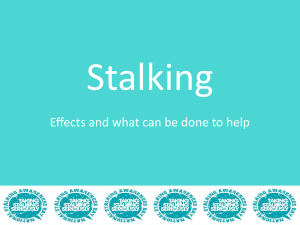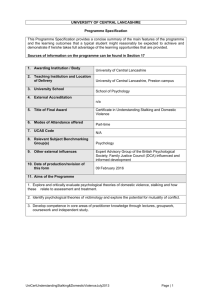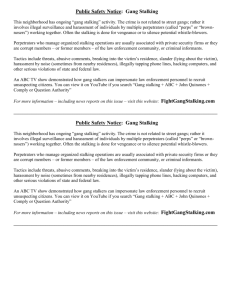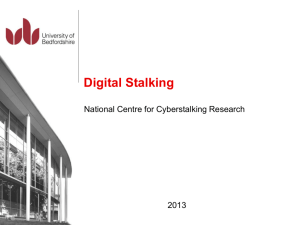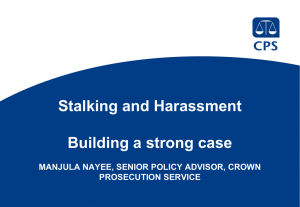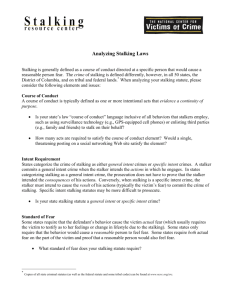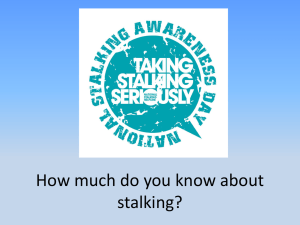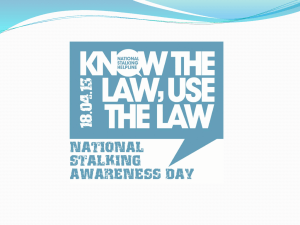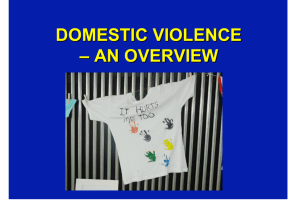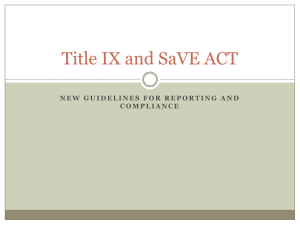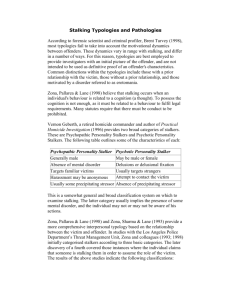Expansion of Illinois Stalking and Cyberstalking Laws
advertisement
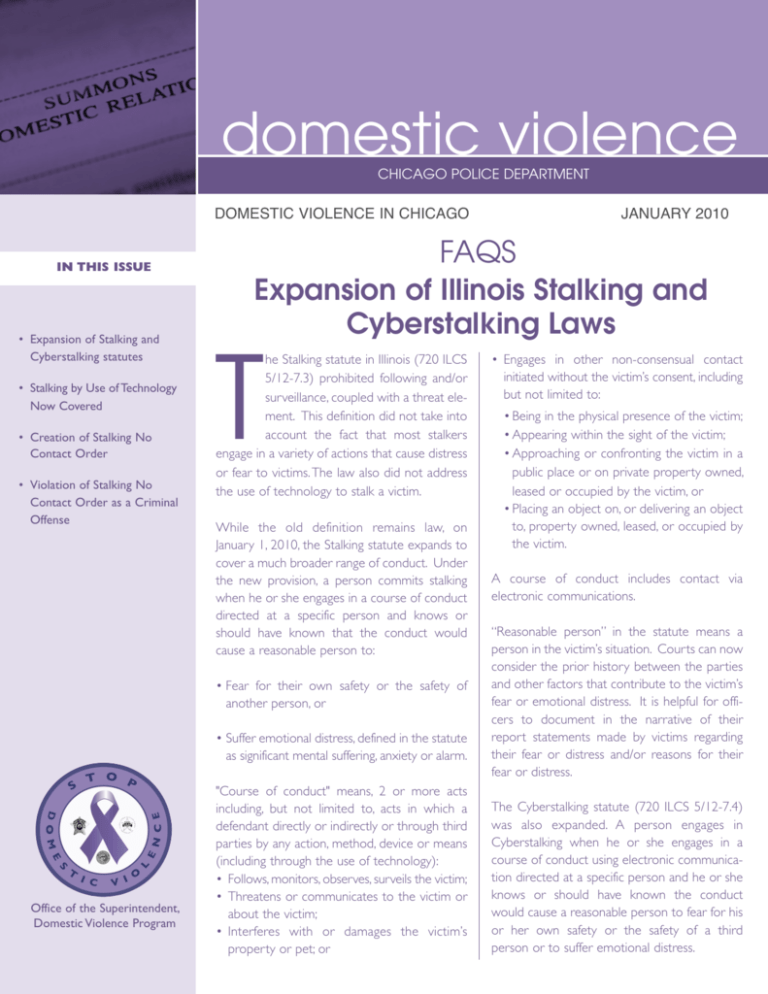
domestic violence CHICAGO POLICE DEPARTMENT DOMESTIC VIOLENCE IN CHICAGO IN THIS ISSUE • Expansion of Stalking and Cyberstalking statutes • Stalking by Use of Technology Now Covered • Creation of Stalking No Contact Order • Violation of Stalking No Contact Order as a Criminal Offense FAQS Expansion of Illinois Stalking and Cyberstalking Laws he Stalking statute in Illinois (720 ILCS 5/12-7.3) prohibited following and/or surveillance, coupled with a threat element. This definition did not take into account the fact that most stalkers engage in a variety of actions that cause distress or fear to victims. The law also did not address the use of technology to stalk a victim. T While the old definition remains law, on January 1, 2010, the Stalking statute expands to cover a much broader range of conduct. Under the new provision, a person commits stalking when he or she engages in a course of conduct directed at a specific person and knows or should have known that the conduct would cause a reasonable person to: • Fear for their own safety or the safety of another person, or • Suffer emotional distress, defined in the statute as significant mental suffering, anxiety or alarm. Office of the Superintendent, Domestic Violence Program JANUARY 2010 "Course of conduct" means, 2 or more acts including, but not limited to, acts in which a defendant directly or indirectly or through third parties by any action, method, device or means (including through the use of technology): • Follows, monitors, observes, surveils the victim; • Threatens or communicates to the victim or about the victim; • Interferes with or damages the victim’s property or pet; or • Engages in other non-consensual contact initiated without the victim’s consent, including but not limited to: • Being in the physical presence of the victim; • Appearing within the sight of the victim; • Approaching or confronting the victim in a public place or on private property owned, leased or occupied by the victim, or • Placing an object on, or delivering an object to, property owned, leased, or occupied by the victim. A course of conduct includes contact via electronic communications. “Reasonable person” in the statute means a person in the victim’s situation. Courts can now consider the prior history between the parties and other factors that contribute to the victim’s fear or emotional distress. It is helpful for officers to document in the narrative of their report statements made by victims regarding their fear or distress and/or reasons for their fear or distress. The Cyberstalking statute (720 ILCS 5/12-7.4) was also expanded. A person engages in Cyberstalking when he or she engages in a course of conduct using electronic communication directed at a specific person and he or she knows or should have known the conduct would cause a reasonable person to fear for his or her own safety or the safety of a third person or to suffer emotional distress. DOMESTIC VIOLENCE IN CHICAGO JANUARY 2010 TYPES OF ORDERS • Emergency orders are valid for 14 to 21 days. An emergency SNCO may be obtained without notice to the respondent. The definitions of “course of conduct” and “reasonable person” are the same as those used in the Stalking statute. STALKING NO CONTACT ORDERS Effective 1 January 2010, Public Act 096-0246, creates the Stalking No Contact Order (SNCO) to protect victims of stalking who are ineligible for an Order of Protection under the Illinois Domestic Violence Act. The definition of stalking in this Act is the same as for the criminal charge of stalking, requiring a course of conduct (2 or more incidents) directed at a specific person that would cause a reasonable person to fear for his or her own safety or the safety of another person or to suffer emotional distress. • Plenary orders are valid for a fixed period of time up to 2 years if issued in civil court, but may be permanent orders if obtained in criminal court upon a conviction for stalking. PENALTIES FOR VIOLATION OF STALKING NO CONTACT ORDERS An initial violation is a Class A misdemeanor. Any second or subsequent violation is a Class 4 felony. DIRECTIONS TO CITIZENS When dealing with a citizen who is experiencing a course of conduct (2 or more incidents) as defined by the stalking statute and that conduct has caused the victim to fear their safety or the safety of a third party or has caused mental suffering, anxiety or alarm, direct the victim to the Clerk of the Court at 555 W. Harrison to complete the required paperwork for a Stalking No Contact Order. REMEDIES AVAILABLE A SNCO may: • Prohibit the respondent from threatening to commit or committing stalking; • Order the respondent not to have any contact with the petitioner or a third party specifically named by the court; For additional information regarding domestic violence issues or topics to be discussed, contact Sergeant Maude Noflin of the Domestic Violence Program at: 312-745-6340 or FAX: 312- 745-6856. • Prohibit the respondent from knowingly coming within, or knowingly remaining within, a specified distance of the petitioner or the petitioner’s residence, school, daycare, or place of employment or any specified place frequented by the petitioner; If you or someone you know needs immediate assistance, call 911. • Prohibit the respondent from possessing a Firearm Owner’s Identification Card, or possessing or buying firearms; or • Order other injunctive relief the court determines to be necessary to protect the petitioner or third party specifically named by the court. The City of Chicago Domestic Violence Help Line number is: 1-877-863-6338 or 1-877-863-6339 (TTY) 2 domestic violence CHICAGO POLICE DEPARTMENT Content for the Domestic Violence Newsletter is provided by the Chicago Police Department, Domestic Violence Program, 3510 South Michigan Avenue, 3rd Floor, Chicago, Illinois, 60653 • Phone: (312) 745-6340 • Fax (312) 745-6856 JANUARY 2010
